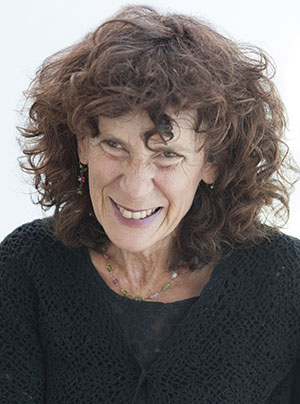
When one poet, Merna Ann Hecht, and one educator, Carrie Stradley, observed their community, their schools, their students, and realized that a plethora of life experiences surrounded them, they put their teaching and their hearts together to create The Stories of Arrival: Refugee and Immigrant Youth Voices Poetry Project at Foster High School, in Tukwila, Washington.
These weren’t typical high school stories. Instead, these students have experiences of leaving their homes, their friends, their schools, their countries … to emigrate to America, where life is often astoundingly different.
Encouraging these English Language Learning students, more than 240 of them over the past six years from 30 countries, to communicate their stories through poetry helps to empower them to find their voices and move confidently into their chosen futures (a paraphrase of the project’s mission).
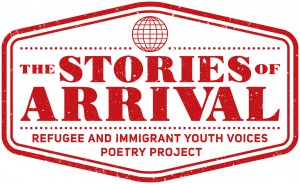
Combine this project with another, Project Feast, and you have not only a cookbook of worldwide appeal but a book of poetry that is often eye-opening, compassionate, and heartrending. A recipe for understanding. A taste of the memories, travels, and longing behind the poets’ words.
Together with their partners The Institute for Poetic Medicine (Palo Alto, CA), the Jack Straw Cultural Center (Seattle, WA), and Chatwin Books (Seattle, WA), these two women and their projects have created Our Table of Memories: Food & Poetry of Spirit, Homeland & Tradition. It’s a beautiful book, part poetry by high school students, part recipes from the traditional cooks from their countries, and part art with illustrations by Morgan Wright, a recent college graduate, newly enrolled in New York City’s Bank Street College to pursue her Master of Arts in teaching.
By publishing this interview with Merna Hecht, it is the hope of Bookology’s editors that you will be inspired to consider a program like this in your own community. Feel free to contact Merna with your questions.
Can you tell us a bit about your life, in particular what pulled you toward poetry?
There is not a moment I can recall when I wasn’t pulled toward poetry. I first heard the incantatory rhythms of poems from my grandfather who gave beautiful, memorized recitations of Longfellow and John Greenleaf Whittier. I think it was second grade when I began writing rhymed poems. Those childhood poems were shaped by what then seemed the magic of the natural world. Noticing details of bugs, petals, leaves, cracks in the sidewalks on my way to and from school often made me late. At the time it seemed like a secret world. Now I think that early impulse for close observation and a deeply private inner world have shaped the poet I’ve become. I have always turned toward poetry to nourish my spirit. As a young woman, I began to read many different poets who spoke to me, challenged me, provoked me and opened my eyes and heart to the beauty and suffering of the world; I’ve not stopped turning these pages. Poetry is the place where I find a wellspring for expression of what seems most tender, most true and most unsayable.
How did you find your way to teaching?
By a somewhat gnarled and twisted path and I’m so glad I got there! I was a registered nurse by the age of 21 and worked for five years as a pediatric nurse. I usually carried finger puppets in my pockets and offered impromptu storied puppet shows at children’s bedsides. Then came a realization that I much preferred the storytelling and puppets to the nursing! “The rest is history,” from working with midwives on the Navaho reservation, to jaunting about as a puppeteer and poet in the schools in rural Idaho, to earning a Masters Degree as a children’s librarian. Under the tutelage of master storyteller, Professor Spencer Shaw at the University of WA, I fell in love with the art and craft of tale-spinning. Fast forward to working as a children’s librarian for Seattle Public Library to my first formal teaching job in a progressive teacher certification program and onward to becoming a teaching artist and a university lecturer.
You’re nationally known as a storyteller. In 2008, the National Storytelling Network presented you with their Brimstone Award for Applied Storytelling, with which you created a pilot program as a poet and storyteller at Bridges: A Center for Grieving Children in Tacoma. Can you tell us about applied storytelling? What does that mean and how do your stories work toward that specific application?
These days, storytellers show up in many places: detention centers, hospitals, war torn countries at centers for young people in trauma and drug rehab facilities for teens. These raconteurs bring the age old pleasure of listening to a tale well told. This allows young people (and all of us) to temporarily walk in someone else’s shoes; it sparks the imagination to life. Through ancient patterns of myth and folktales stories can allow a trust in possibilities to take hold. To apply storytelling in settings for young people and adults who have experienced loss or trauma helps create safe space and gathering places where deep listening can occur. There are universal truths in stories from all cultures. Many stories reflect the inevitability of loss in human life and they speak to our interconnectedness to each other, to animals, trees, the moon, the stars and to mysteries beyond us. In this way stories can ease a sense of isolation and loneliness. Finding the right story for a situation, a group, or an individual is part of applying storytelling to special settings and using stories to help others trust that they can overcome obstacles and find their inner strength and courage.
What drew you toward working with refugee and immigrant children?
The short answer is that these young people are my teachers! Their determination to succeed in high school, continue on to college and contribute to this country and/or to return to their homeland to help others inspires me and gives me hope. They dream of becoming doctors, nurses, peace-makers, environmentalists, actors, pilots and they do not bemoan the difficulties they have experienced at such a young age. Loss of family members, life in refugee camps, forced migrations, lack of enough food, health care, education and still they are model citizens. They are young people who are hopeful, curious, and deeply kind who wish to help create a more peaceful, humane world.
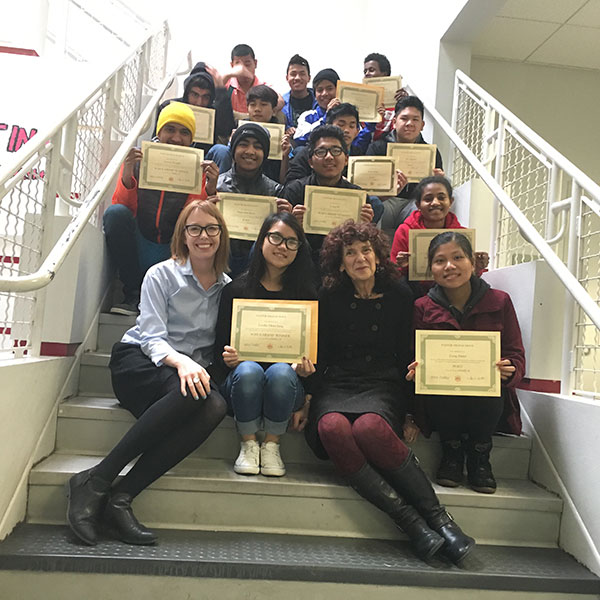
You’re an organic gardener with respect for food traditions. How did this inspire you for Project Feast and how did the idea of the cookbook, Our Table of Memories, with poetry and illustrations come into being?
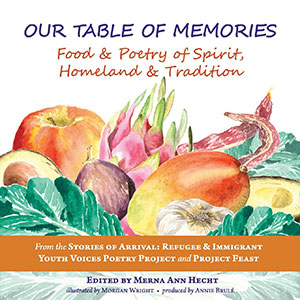 When I heard about Project Feast and found that it was located within a mile of the school my idea for a collaboration sprang in part from years of “hands on” intensive gardening and cooking and from a passion for exploring different ways people across the globe prepare and share food. This love of cross cultural food is something Carrie and I share. When she heard the idea for collaborating with Project Feast her eyes lit up with a “yes!” We both recognize that when people leave their homelands, a deep sense of home remains with them, in part, with eating and growing the foods of their cultures. We felt that a food-themed project would generate a rich outpouring of poems. Given that food and poetry both speak languages of flavor, scent, spice, texture, and color we wanted to include illustrations that would reflect the sensory feel of the poems—to create a presentation much like a memorable meal which the eye feasts upon before the palette! We also wanted to celebrate our students and the refugee women of Project Feast by including beloved recipes from their memories, their families and their homelands.
When I heard about Project Feast and found that it was located within a mile of the school my idea for a collaboration sprang in part from years of “hands on” intensive gardening and cooking and from a passion for exploring different ways people across the globe prepare and share food. This love of cross cultural food is something Carrie and I share. When she heard the idea for collaborating with Project Feast her eyes lit up with a “yes!” We both recognize that when people leave their homelands, a deep sense of home remains with them, in part, with eating and growing the foods of their cultures. We felt that a food-themed project would generate a rich outpouring of poems. Given that food and poetry both speak languages of flavor, scent, spice, texture, and color we wanted to include illustrations that would reflect the sensory feel of the poems—to create a presentation much like a memorable meal which the eye feasts upon before the palette! We also wanted to celebrate our students and the refugee women of Project Feast by including beloved recipes from their memories, their families and their homelands.
Can you share a particular story from this Project that gave everyone hope?
One of Carrie’s ELL classes had fourteen boys and only two girls. Hope certainly flourishes when a group of adolescent boys, all refugees from different countries, cultures and ethnicities, openly support and applaud each other for writing poems that are vulnerable and emotionally expressive. Hope flourishes when they tell us that they’ve found their voices and a way to tell their stories through poetry. At the project’s conclusion those who wished to apply for a scholarship were asked to reflect on what they learned from poetry. Their replies filled us with hope and in truth, with tears, here are a few short excerpts:
Khai, from Burma
I can speak the truth in the poem I wrote… Poems will make other people understand us (immigrants). As an immigrant and a lot of others who are just like me, we have a vastly hard life… One of the ways that we can explain our painful past is only by a POEM, it is the only way to make a connection with everyone; poems make us two in one. Poems are vastly crucial to all of us because poems are ALIVE! There is peace, love, friends, family, and much more in a poem. This is why poems are extremely important to us (immigrants) and to everyone who has a heart.
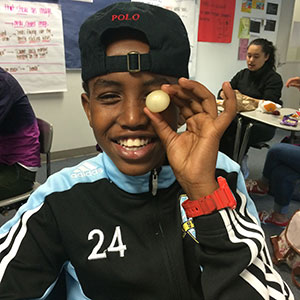
Abdi A., from Somalia
I was born in a refugee camp in Dadaab, Kenya, and lived there most of my life. Writing poems helped me remember and appreciate what I have now and also helped non-immigrants to have a better understanding of what is it really like to be a young boy with a hopeless dream of becoming a doctor. I remember a white man who worked with the IOM asking me what my dream was and I told him I wanted to be a doctor and laughed at myself because I thought it was ridiculous and ‘’too big’’ for someone like me. But here I am today living a happy life and working towards my dream… Poetry doesn’t just show us how much we share, it helps us see the world in an entirely different way. When I heard Kang Pu’s poem about how his mom died and the struggle that his family had and how the government didn’t even help, I understood him better… Poetry is universal. ELLs can learn about or read poetry in their primary language, helping them bridge their worlds… I plan on going to a four-year college and I still have that dream of becoming a doctor, so I can go back home one day and help the sick and the needy.
Has there been an effort made to replicate this project in other high schools around the country?
This is a next step that project co-director and ELL teacher extraordinaire, Carrie and I have wanted and intend to accomplish. Along with the wonderful engagement and sage advice of John Fox, founder/director of the Institute for Poetic Medicine, (we are proudly an IPM Poetry Partner Project) we intend to take the next step and publish a template of poetry prompts and activities along with a collection of resource material for replicating this poetry project.
WHERE TO BUY OUR TABLE OF MEMORIES
The poems in this book are luscious but, to tempt you further, the recipes includes Doro wet: an Ethiopian Chicken Stew (pgs. 120 – 121), Arroz con Leche, (pgs. 130 – 131), Zawngtah: Burmese Tree Beans with Tilapia (pgs. 136 – 137), Orange Iraqi Teatime Cake (pgs. 154 – 155) and many more. Is your mouth watering yet? Everything about this book is inviting … you will embrace it!
SAMPLE
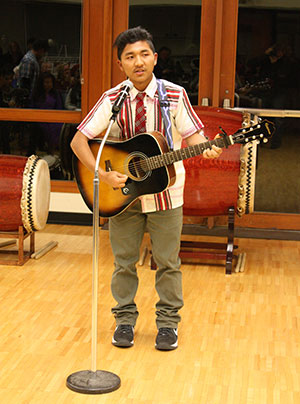
Here’s a sample of one of the heart-touching poems in Our Table of Memories:
MY MOTHER’S KITCHEN
Kang Pu, from Burma
When my mom cooked it smelled of sweet wintertime cherries,
of a solitary forest with rain falling
and it smelled like the murmur of a lonely bird, singing,
I picture the spherical smoke rising from her kitchen
it was like the sound of sleep at night,
it was like arriving home safe and sound
the sounds of her kitchen were peaceful.
I still long for the laughter of those family meals
we all waited for that table, my mom’s table,
how she prepared every family meal,
this is what I still long for,
so often I remember my mother
nothing can take her memory away from me,
it is truly difficult that I have departed
from my motherland,
and from my mother’s kitchen.
Kang Pu – MY MOTHER’S KITCHEN
The reason I wrote this poem is for memories of my mom and her kitchen. It was difficult for me to write this poem because I still long for my mother’s kitchen. Sometimes it makes it hard for me to study. Yet, no matter how far away from my parents, I am still holding their lessons and still using what they taught me. Without lessons from parents it’s hard to be in community with others and hard to stand on your own.
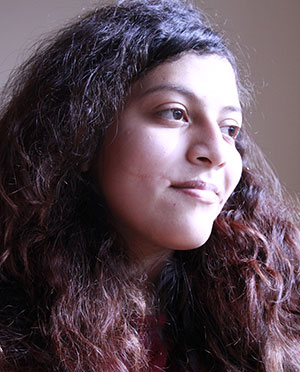
And another sample:
WHERE FOOD IS ART
Nathaly Rosas, from Mexico
I am from a place where
The food is an art and every bite
Is a spicy piece of our culture.
Where the smells call you to enjoy
And the flavors take you to your memories.
Read more poems like these on Merna Hecht’s website.
RESOURCES
“Stories of Immigration and Culture” poetry podcasts are available here, hosted by the Jack Straw Cultural Center.
Institute for Poetic Medicine, founded by John Fox, where Merna and Stories of Arrival are Poetry Partners.
Stories of Arrival: Immigrant Youth Voices Poetry Project

Fabulous interview about a fabulous project. Many thanks for sharing.
What a wonderful project…both for the young poets as well as for everyone who hears their stories.
I bow deeply to the achievement of all of the young poets and storytellers and their parents and relatives and to Merna Hecht and her colleagues. Thank you with all of my heart.
Merna Hecht’s poetry projects with immigrant youth have so inspired me over the years. Each student finds his or her voice, comes to understands the value of his or her own story, and in the sharing is affirmed by a larger community. This process invites love and hope where loss and fear could so easily takeover. Partnering with Project Feast to create Our Table of Memories was sheer genius.
To begin to step inside another’s life through their poetry and sharing of their experience and longings, is a gift of immeasurable value. Can we not see ourselves, and feel connected to these wonderful young people? They cannot remain strangers in our minds, for they touch our souls in the deepest fathoms.